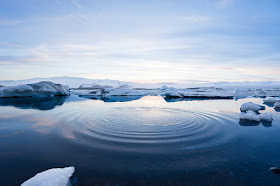Phillip Ball writes: There aren't terribly many scientists who study liquids, but I was once one of them, and we tended to shun water. This might make us sound like bakers with an aversion to bread, but we had a good reason: water broke all the rules. There is a perfectly good 'theory of liquids' that has been painstakingly developed since the late nineteenth century, and it is astonishing what it can accomplish in terms of explaining what liquids are and what they do. But it is of rather little use for understanding water.
Here's an example. Many solids can be melted to form liquids, but when they cool and freeze again, they typically shrink and get denser. Fill a cup with molten wax, say, and you'll find it slightly less than brim-full when the wax sets. The same with molten iron or lead, or molten rock, which is why lava contracts and cracks when it cools and we are left with formations like the Giant's Causeway.
But water? We know the answer already, for we take care never to freeze bottles of milk or champagne. The water expands when it becomes ice, and the bottle shatters. Because of this expansion, ice is less dense than water - the same volume of ice ways less than water - and so ice floats on water. If that were not so - if water behaved 'normally', and became denser when it froze - icebergs would sink instead of floating around the polar oceans. There would, in fact, be no North Pole to plant a flag in, for it is nothing but an ice sheet adrift on the Arctic Ocean.
The expansion of water when it freezes bursts our water pipes in winter, and weakens our buildings as water widens cracks when it turns to ice. Many years of such freeze-thaw cycles can reduce rocks to rubble. On the other hand, ice floating on a wintry pond provides a thermal blanket that can stop more heat escaping and keep the water below from freezing solid, to the benefit of pond life.
Aquatic life gets a further advantage from water's oddness. Even before a liquid freezes, it generally contracts slightly as it gets cooler. This is because the molecules in the water jiggle about less frantically when they are colder, and so they have less inclination to push one another apart - just as a regiment of soldiers can pack together more closely than a wildly jiving crowd on a dance floor. Water seems to observe this expectation - until it reaches 4ºC, four degrees above its freezing point. If you cool water below 4ºC, it starts to expand. Only slightly - not as much as it does when it freezes at 0º C - but enough to present a puzzle. It is almost as if the water begins to sense the approach of the freezing-induced expansion.
This means that water is densest at 4ºC; at this temperature, it expands if you heat it or if you cool it. Why 4ºC? In his Guide to the Scientific Knowledge of Things Familiar (1876), the sage Reverend Dr Brewer decides that this has been 'wisely ordained by God'. That explanation doesn't seem to have satisfied scientists for long, if indeed it ever did.
Nevertheless, one might perceive wisdom in this behaviour. It means that the water at the bottom of a cold pond - the densest water - is always a few degrees above freezing. So ponds freeze from the top down, not from the bottom up. This helps them to avoid freezing solid in a bad winter, something that would kill the fish and crush them for good measure.
One of the most striking and fortuitous anomalies of water is that it is a liquid at all. Naively, you would expect water to be a gas at the temperatures and pressures encountered on the Earth's surface. All other similar chemical compounds - hydrogen sulphide, ammonia, hydrogen chloride - are gases under these conditions. By rights, the oceans should all be up in the air, giving us a thick, muggy atmosphere over a parched earth. But something seems to hold water molecules together in the liquid, preventing them so easily from flying apart into a vapour.
Water has a surprising capacity to absorb heat. That's to say, if you want to make water hotter, you have to put in a larger amount of heat, relative to other liquids. This means that it takes longer than it 'should' to boil a kettle, but there are happier consequences too. The oceans are slow to change their temperature, maintaining a constant environment for the organisms that teem within it. Water's large 'heat capacity' also makes the oceans an astonishing reservoir of heat, which ocean currents carry from the tropics (where water is warmed by the sun) to high-latitude regions. This redistributes heat over the planet and reduces the temperature differences between high and low latitudes. The Gulf Stream, bringing warm water from the Gulf of Mexico across the Atlantic Ocean, keeps Northern Europe much warmer than Labrador at the same latitude on the American coast by transporting every day twice as much heat as would be produced by burning all of the coal mined globally in a year.
The list of water's anomalies, compared with other liquids or 'similar' chemical compounds, runs to a few dozen entries. Some are more recondite and revealed only by careful scientific measurement, such as the fact that water gets less rather than more viscous when squeezed. Ice is itself a strange substance too, which can adopt at least fourteen different forms when compressed to high pressures. Water, we must admit, is the most eccentric liquid we know.



No comments:
Post a Comment